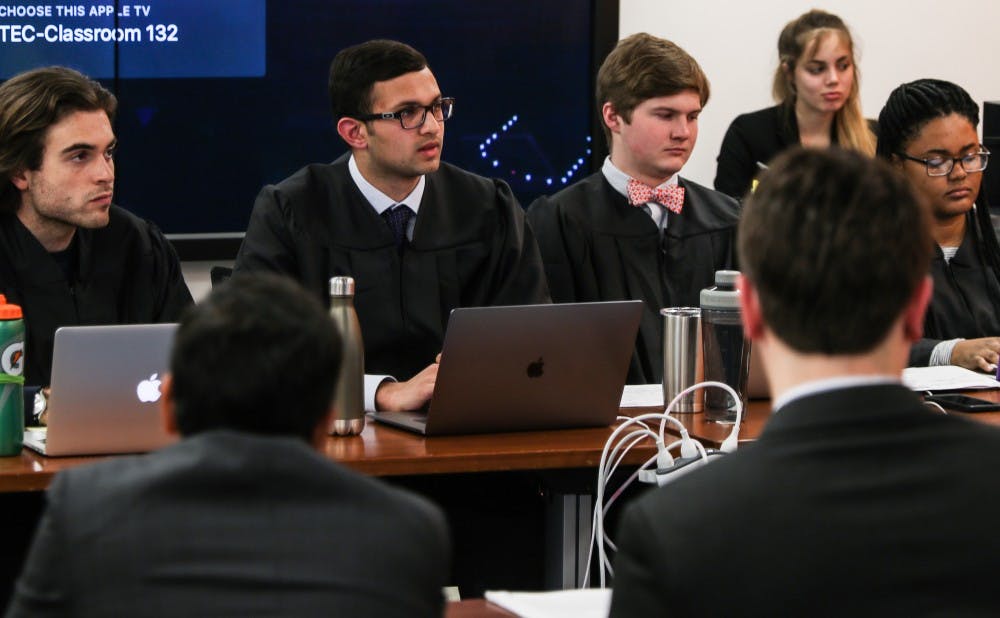On Monday, the Duke Student Government Judiciary heard the case of Tent 74.
It all began at approximately 2:30 a.m. on Valentine's Day.
Line monitor Noah Eckberg, a junior, walked around the entirety of Krzyzewskiville using a blowhorn to announce a routine tent check. After the tent group did not check in with line monitors at the front of K-Ville, Eckberg used his blowhorn again to call out Tent 74 four times—two times from the back of K-Ville and two times from the front.
Tent 74 never checked in, marking their second missed tent check. The line monitors follow a "two strikes, you're out" rule, and the tent group was dismissed from K-Ville and moved to number 55 on the waitlist. Junior Charlie Pearlman, captain of Tent 74, and his team members had been in K-Ville since Jan. 21.
Pearlman and Tent 74 believe they have been wronged. Two members of the tent claim that they were present in K-Ville at 2:30 a.m. on Feb.14 and slept through the tent check because one has hearing difficulties and the other is a deep-sleeper.
The tent members provided the line monitors digital authentication on their cellphones proving they were in their tent at the time of the check. But K-Ville policy does not allow the use of such digital services as proof of tenters' location during checks.
Tent 74 filed a petition alleging that the policy is discriminatory against those with hearing disabilities and violates the equal protection clause of the DSG constitution. The Judiciary has not yet released its decision.
It's currently white tenting season in K-Ville, meaning that the tent only needed two members there during the night hours. Both tenters did not realize they had missed the tent check until they woke up at 8 a.m. the next morning. Senior Sanjeev Dasgupta, one of the two tenters and a member of The Chronicle's photography staff, claims he was unable to hear the blow horn as a result of his hearing disability. The other tenter, senior Logan Kirkpatrick, was said to be a deep-sleeper.
Dasgupta was allegedly unaware of the severity of his disability until this incidence and had not registered his disability with the Duke Disability Office—he received formal documentation of his hearing disability the day of the judiciary hearing. The documentation shows that Dasgupta has a hard time hearing at higher frequencies, and the bullhorn used to announce tent checks falls under said frequencies.
“Do we want to have a K-Ville where persons with disabilities have the burden placed on themselves to approach the head line monitors even though the head line monitors have not indicated anywhere in their policy that they make special exceptions?” asked Kirkpatrick.
The petitioners argued before the Judiciary that Tent 74 was put in a unfair position since there were not two people inside the tent who were capable of hearing bullhorns throughout the night. Line monitors countered the petitioner's arguments by saying that they consistently urge tenters to have a buddy system, an informal policy in which friends of tenters make sure they are awake for tent checks during the night.
Co-head line monitor Sara Constand, a senior, said line monitors would have surely accommodated for any hearing disability had they been notified. But no member of Tent 74 ever brought up a disability to the line monitors, she said, emphasizing that there is no way they can accommodate for disabilities they are not aware of.
Following the missed tent check, Pearlman and his tent group emailed the line monitors digital evidence to attempt to show that they were present in K-Ville during the check. However, the line monitors refused to consider the digital location evidence, since the 2018 K-Ville Policy prohibits the use of digital evidence in such appeals.
The tenters argued that this year's policies were enacted through an improper procedure by the DSG Senate, which approved the policy updates by unanimous consent during an online meeting several days into tenting season. Therefore, the petitioners argue that the groups digital location evidence should be considered.
Constand said that digital location evidence not only creates equity issues but is also unreliable—an individual could simply leave their phone in K-Ville and claim they were there all day. Additionally, it puts students who might not be able to afford a phone with GPS at a disadvantage, and the digital circle representing the location of the tent member(s) who were allegedly present extended beyond the limits of K-Ville into Wilson gym and the parking lot.
“The whole point of K-Ville is that it's a meritocracy and that students can earn their entrance to the game through their own work," Constand said.
Finally, the Judiciary questioned Constand and other line monitors serving as witnesses as to what “missing a check” truly meant. The Judiciary was confused as to how in some cases this month, students exhibiting flu-like symptoms were not in K-Ville but “met” checks, since line monitors were instructed to make exceptions for students exhibiting flu-like symptoms.
The line monitors present affirmed that making a tent check has to do with checking in with a line monitor before the check ends. It has nothing to do with whether or not you are in K-Ville during the time the check is called, the monitors said.
Petitioners asked the Judiciary to rule that K-Ville's ban on all forms of digital authentication unfairly disadvantaged tenters with disabilities and violated the equal protection clause contained in Article IX, Section 5 of the DSG Constitution. Petitioners also contended that the procedure by which the 2017-18 K-Ville policy was enacted violated the by-law voting requirements of Article X, Section 2 of the DSG Constitution and the reporting requirements of Article IX of the executive by-laws.
The Judiciary did not announce when it would release a formal ruling on the case.
Get The Chronicle straight to your inbox
Sign up for our weekly newsletter. Cancel at any time.

